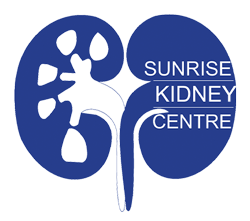Hepatorenal Disease treatment in Vijayawada
Hepatorenal disease (HRD) is a severe complication of advanced liver cirrhosis characterized by progressive renal impairment due to altered hemodynamics and circulatory dysfunction. It manifests as a decline in kidney function without intrinsic renal pathology, primarily driven by splanchnic vasodilation, reduced effective arterial blood volume, and activation of vasoconstrictor systems like the renin-angiotensin-aldosterone system. HRD worsens prognosis and complicates management, often culminating in hepatorenal syndrome (HRS). Early recognition and treatment with vasoconstrictors like terlipressin, along with volume management, are crucial. Liver transplantation remains the definitive therapy for reversing the underlying disease process.
Classification of HRD
It can be classified into two main types:

- Type 1 Hepatorenal Syndrome
Rapid and often precipitated by infections or bleeding leading to a swift decline in renal function, - Type 2 Hepatorenal Syndrome
More gradual and is associated with refractory ascites.
Emerging research has identified atypical variants, such as HRS with preserved kidney function despite severe liver impairment, and cases involving combined hepatorenal and cardiorenal syndromes, highlighting the need for nuanced diagnostic and therapeutic approaches tailored to these unique presentations.
Symptoms of HRD
Hepatorenal disease manifests through a combination of symptoms including progressive fatigue, decreased urine output, and fluid retention leading to swelling in the legs, abdomen, and ankles. Patients may also experience confusion or altered mental status due to toxin buildup, along with decreased appetite, nausea, and jaundice, all reflecting the interplay between liver dysfunction and kidney impairment. Additionally, laboratory findings often reveal elevated serum creatinine and blood urea nitrogen levels, along with abnormal liver function tests, emphasizing the dual organ failure characteristic of this condition.
Treatment of HRD
Hepatorenal Disease Treatment in Vijayawada focuses on improving renal function and addressing underlying liver pathology. Initial treatment involves volume expansion with albumin to improve circulatory dynamics, alongside vasoconstrictors such as terlipressin, norepinephrine, or midodrine to counteract splanchnic vasodilation. Renal replacement therapy (RRT) may be necessary for refractory cases, especially in advanced kidney failure. Simultaneously, managing precipitating factors like infections or gastrointestinal bleeding is crucial. Liver transplantation remains the definitive treatment, offering potential reversal of the syndrome. Supportive care includes careful monitoring of electrolytes, avoiding nephrotoxic drugs, and addressing complications like ascites and encephalopathy to optimize patient outcomes.
To know more about HRD and related ailments visit Sunrise Kidney Centre and schedule an appointment with Dr. M. V. Sai Krishna, one of the leading nephrologists in Vijayawada.

